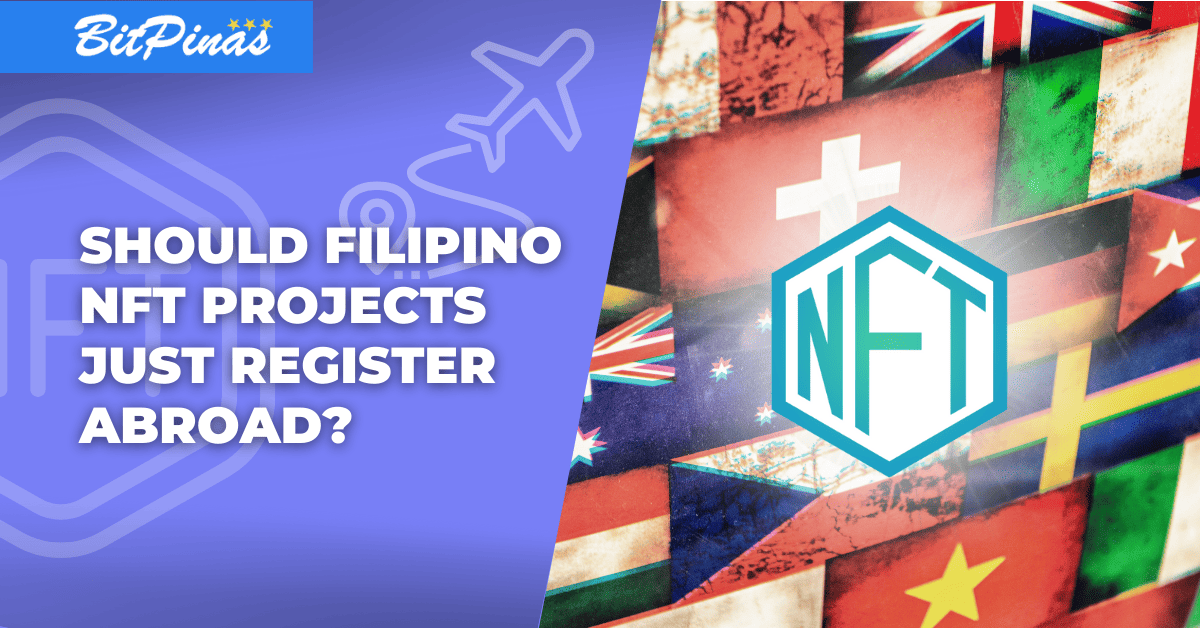Should Filipino NFT Projects Just Register Abroad?
He reiterated that not having the License to Transact Business by the SEC will only result in limited privileges in the country.

By Nath Cajuday
*Note that everything in this article must not be construed as legal advice. It is best to contact your lawyer for legal opinion.
- Part 1: What is the Current State of NFT-related Laws in the Philippines?
- Part 2: Are NFT Art and Collectibles Considered Security?
“The point I’m trying to make is, this sunrise industry might be exposed to a lot of legal uncertainties, and to somehow protect your self-business or your ventures from these legal uncertainties, it might be worth considering to set things up offshore and maybe set up a local subsidiary here in the Philippines if it makes business sense.”
This is the clarification of Atty. Rafael Padilla, a Commercial Lawyer specializing in Fintech and Crypto, when asked about the idea of NFT Projects opting to register abroad during a Twitter Space hosted by BitPinas last March 25, 2022.
“Considering the option of setting things up, that should be carefully studied.”
On Setting Up Abroad
Padilla added that many of the blockchain and crypto projects that he handled set things up abroad.
“It’s not because (we) want to avoid Philippine laws and regulation, but because the positioning of the business is a global project. And there’s nothing weird about it. We now have a technology that allows us to offer our product to the global market. And so, the positioning of the product should be global.”
The commercial lawyer also explained that setting up abroad means legal avoidance, a way to properly structure the management of a business that does not trigger local regulations,
“Once you set things up abroad, it does not end there. Having an offshore strategy or approach (to) something you can consider to somehow protect yourself from legal uncertainties.”
Moreover, Padilla emphasized that opting to register abroad is a common approach in the blockchain industry because the nature of business involves the global market.
Legal Considerations
On the other hand, Ismael Jerusalem, founder and chief executive officer (CEO) of Ownly, asked about the legal considerations when it comes to a scenario where an entity is registered outside the country but is operating here.
The lawyer clarified that there are many nuances that should be considered in this case.
“Kung ang business ay non-financial at hindi naman kayo nagbebenta ng investment products here sa Philippines, hindi mo naman kailangan mag-set-up ng entity dito sa Philippines,” he answered.
[“If the business type is non-financial and your business does not market investment products here in the Philippines, your business does not need to set-up an entity here in the country.”]
Offshore Entity
Padilla explained that being an offshore entity does not mean that it cannot operate in the country.
“Mayroon kasi tayong konsepto sa batas under the Revised Corporation Code, mayroong sinasabi na ‘License to do Business’, ang concept ay, if you’re a foreign company, like an offshore entity, and you want to do business here in the Philippines, you have to obtain this license to do business, to be issued by the SEC.”
[“We have a concept of law under the Revised Corporation Code, where it indicates the ‘license to transact business.’ The concept is: if you are a foreign company, like an offshore entity, and you want to do business here in the Philippines, you have to obtain this license to do business, to be issued by the Securities and Exchange Commission (SEC)”]
Limited Privileges in the Country
However, the lawyer also clarified that if a business is unregulated, even if it is an offshore entity, that business can operate in the country even if it has no “License to Transact Business” and will not be considered as an illegal entity.
“Ang sabi sa batas, sa Revised Corporation Code, ‘pag wala kang ‘license to do business,’ hindi ka pwedeng pumunta sa korte para magsampa ng kaso against sa clients, customers, or partners mo.”
[“That law states that, under the Revised Corporation Code, if a business does not have a ‘license to do business,’ that business cannot go to court and file charges against any of its clients, customers, or partners.”]
He reiterated that not having the License to Transact Business by the SEC will only result in limited privileges in the country.
On the other hand, Padilla stressed that the application of the law is vague, but the blockchain technology brought smart contracts that can be used as a solution to the vagueness of the law.
“’Yun ang tingin kong importanteng contribution ng blockchain technology – smart contracts, it will be a self-regulatory tool that allows contracts of transactions to be facilitated.”
[“For me, the important contribution of the blockchain technology is the smart contracts, where it will be a self-regulatory tool that allows contracts of transactions to be facilitated.”]
This article is published on BitPinas: Should Filipino NFT Projects Just Register Abroad?
Disclaimer: BitPinas articles and its external content are not financial advice. The team serves to deliver independent, unbiased news to provide information for Philippine-crypto and beyond.





